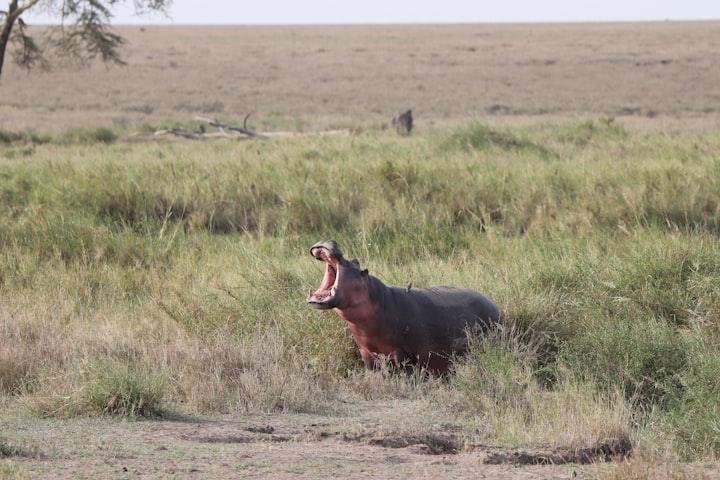Hippopotamus
Hippopotamuses, or hippos for short, are some of the largest land animals on Earth. They are found in sub-Saharan Africa, living near rivers, lakes, and other bodies of water. Hippos are fascinating creatures with unique adaptations that allow them to survive in their watery habitats.
Physical Characteristics
Hippos are massive animals, with adult males weighing up to 3,500 kg (7,700 lbs) and females weighing up to 2,700 kg (6,000 lbs). They can be up to 4 meters (13 feet) long and 1.5 meters (5 feet) tall at the shoulder. Their skin is gray or brown and thick, up to 2.5 cm (1 inch) in some places, which helps protect them from bites and scratches during fights with other hippos or predators.
Hippos have large heads with broad, flat noses and small ears and eyes. They are herbivores, feeding on grasses, leaves, and fruits, and their teeth are adapted for grinding tough vegetation. They have large, curved tusks that can be up to 50 cm (20 inches) long, which they use for fighting and defense.
Habitat and Behavior
Hippos spend most of their time in or near water, as they need to keep their skin moist to avoid drying out and overheating. They are excellent swimmers and can hold their breath for up to 5 minutes while underwater. They can also run on land at speeds of up to 30 km/h (19 mph) to escape danger or defend their territory.
Hippos are social animals and live in groups of up to 30 individuals. They communicate with each other using a variety of vocalizations, including grunts, growls, and snorts. They also mark their territory by spreading their feces with their tails and secreting a thick, red substance from their skin called "blood sweat."
Reproduction and Life Cycle
Female hippos give birth to a single calf after a gestation period of 8 months. Calves weigh around 45 kg (100 lbs) at birth and are able to swim and walk within hours. They nurse from their mother's milk, which is very nutritious and high in fat.
Calves stay with their mother for up to 2 years, learning how to forage and defend themselves from predators. Female hippos become sexually mature at around 5-6 years old, while males mature at around 7-8 years old. Hippos can live up to 40 years in the wild, although they are often threatened by habitat loss, hunting, and poaching.
Conservation Status
Hippos are classified as vulnerable by the International Union for Conservation of Nature (IUCN) due to habitat loss and poaching. They are also threatened by climate change, as rising temperatures and droughts can affect their access to water and food.
Efforts are being made to protect hippos and their habitats, including the establishment of protected areas and conservation programs. Educating local communities about the importance of hippos and their role in the ecosystem is also crucial for their survival.
Conclusion
In conclusion, hippos are remarkable animals that have adapted to living in aquatic environments. They are massive creatures with thick skin, large tusks, and powerful jaws that allow them to feed on tough vegetation. Hippos are social animals that communicate with each other using a range of vocalizations and physical displays.
Unfortunately, hippos face many threats in the wild, including habitat loss, hunting, and poaching. It is important that we take action to protect these magnificent animals and their habitats to ensure their survival for generations to come. Conservation efforts, such as the establishment of protected areas and education programs, are crucial in protecting hippos and their ecosystems.
Overall, hippos are a fascinating and important species that deserve our attention and conservation efforts. By working together, we can help to ensure that these incredible animals continue to thrive in the wild for many years to come.







Comments
There are no comments for this story
Be the first to respond and start the conversation.